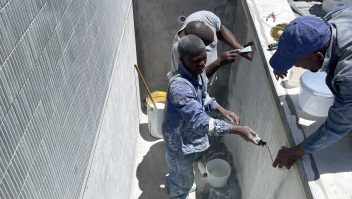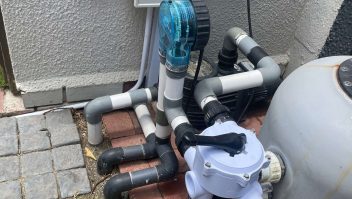Maintaining a crystal-clear swimming pool in South Africa requires more than just scooping leaves. Whether you’re a new homeowner in Cape Town or managing a hotel pool in Durban, understanding the basics of pool care is essential for water quality, safety, and long-term savings. In this post, we break down the “3 C’s” and “3 B’s” of pool maintenance, and share essential tips every pool owner should know.
Circulation, Cleaning & Chemistry – The Foundation of Healthy Pool Water
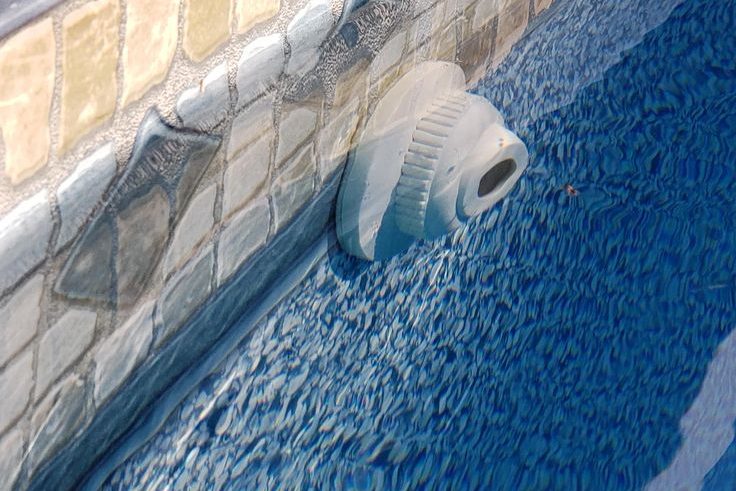
To keep your pool sparkling and safe, you need to master the three key pillars of pool care:
1. Circulation: Keep the Water Moving
Water that doesn’t circulate becomes a breeding ground for algae and bacteria. That’s why your pool pump and filter should run 8–12 hours daily. Make sure return jets are angled properly to move debris toward the skimmer, and regularly clean the filter to prevent blockages. Proper circulation is the backbone of any healthy pool.
2. Cleaning: Remove What You Can’t Filter
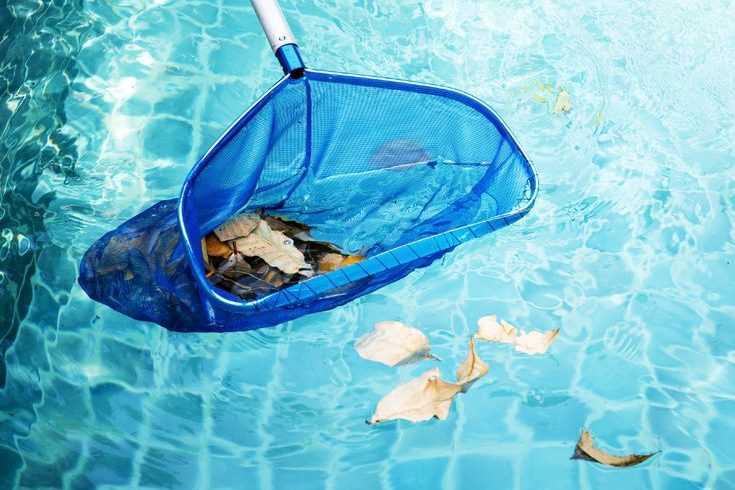
Debris, leaves, dirt, and algae spores can still settle even with good circulation. Manual and automatic cleaning work together for best results. Skim daily, vacuum weekly, and brush walls and floors regularly to prevent buildup in corners and shady spots.
3. Chemistry: Balance for Clarity and Safety
Chemically balanced water prevents eye irritation, equipment damage, and cloudy water. Regularly test your water for:
- pH (7.2–7.6)
- Chlorine (1–3 ppm)
- Alkalinity (80–120 ppm)
- Calcium Hardness (200–400 ppm)
Don’t Forget the Basket, Brushing & Balance – Your Weekly Ritual
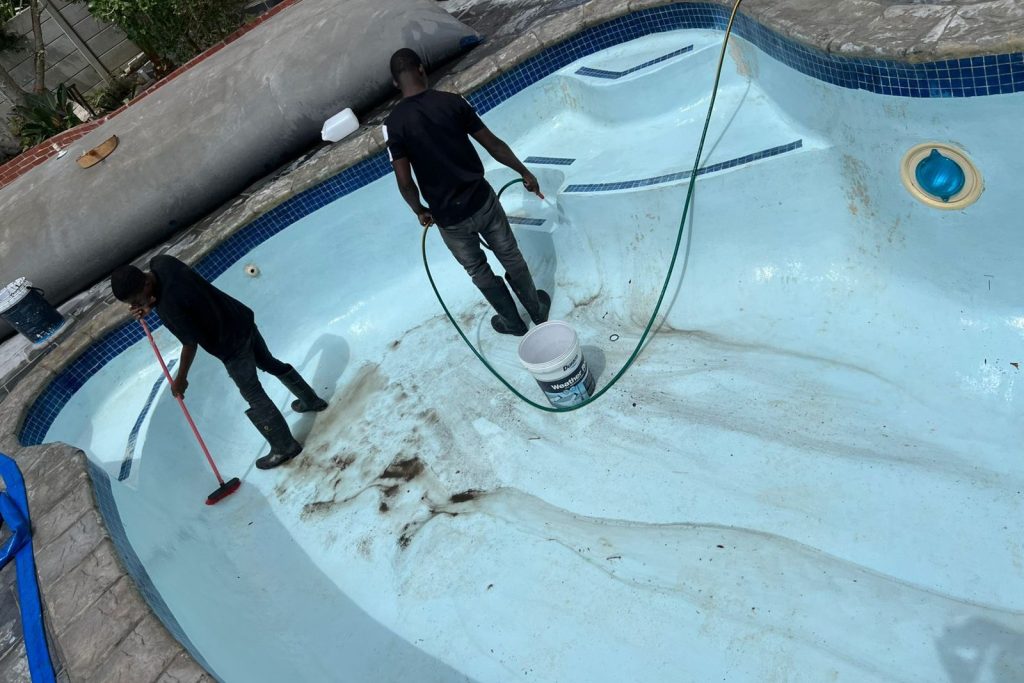
If you want a clean and low-maintenance pool, make the “3 B’s” your best friend:
Basket: Empty the skimmer and pump baskets weekly to improve water flow and filtration.
Brushing: Algae loves corners and steps. Brush the entire pool surface weekly.
Balance: Test your water weekly and adjust chlorine, pH, and stabilisers accordingly.
Must-Have Tools for Every Pool
You don’t need to be a professional to keep your pool in great shape, but you do need the right gear. Every pool owner should have:
- A reliable test kit or digital water tester
- Telescopic pole with interchangeable net, vacuum head, and brush
- Manual or robotic pool vacuum
- pH increaser and decreaser
- Chlorine, algaecide, and stabiliser
- Leaf skimmer net
Need help with gear or upgrades? Explore Pool Equipment Installations in Cape Town.
Commissioning a New Pool? Here’s How to Get It Right
Whether it’s a new pool or a freshly renovated shell, proper commissioning is crucial. Done right, it protects your investment from day one:
- Clean the interior before filling to remove dust and residue
- Fill slowly to reduce thermal or structural stress
- Prime and run the pump system to test circulation and inspect for leaks
- Balance water chemistry within 24 hours of filling
- Run the pump continuously for the first 24–48 hours
Need assistance commissioning a pool in the Western Cape? Book your installation with Pools Reno.
Borax: The Secret Ingredient for Softer, More Stable Water
Borax isn’t just for laundry – it’s a pool owner’s secret weapon. Adding borax helps to:
- Maintain pH without affecting alkalinity
- Make water feel silkier and more comfortable
- Reduce chlorine demand
- Control algae
It’s affordable, safe, and widely available at pool supply stores in South Africa.
BS in Swimming: What It Really Means
In swimming terminology, BS typically stands for Backstroke, one of the four official competitive strokes. However, in pool servicing or maintenance, the abbreviation might also refer to:
- Backwashing System
- Booster System
- Balance System
Always check the context, especially when reading product manuals or pool equipment guides.
Using Bleach in Your Pool: Is It Safe?
Yes, you can use plain unscented bleach (sodium hypochlorite) as a chlorine source in emergencies or for DIY sanitising. However:
- It’s less concentrated than pool-grade liquid chlorine
- It may contain additives not intended for pool use
- It can be more expensive per dose over time
Stick to pool-specific chlorine for better consistency. Learn more in our post on Chlorine vs Bleach for Swimming Pools.
Pool Servicing 101: What a Proper Clean Should Include
Proper servicing goes beyond the basics. A full pool service includes:
- Testing and rebalancing water
- Emptying skimmer and pump baskets
- Brushing walls, steps, and surfaces
- Vacuuming debris and sediment
- Backwashing filters and checking pump pressure
- Inspecting chlorinators, timers, and heaters
For scheduled cleaning and servicing, choose our Pool Cleaning Services in Cape Town.
What Really Drives Up Pool Costs?
Pools are an investment, and several factors can make that investment steeper:
- Pool size and shape – Larger pools need more labour and materials
- Finish type – Fiberglass and marbelite finishes cost differently
- Extra features – Heating, LED lighting, automation, water features
- Landscaping and paving – Affects both design and excavation costs
- Repairs and renovations – Resurfacing or fixing leaks adds to the bill
Curious about pricing? Read our post on Pool Renovation Costs in South Africa.
Frequently Asked Questions
What is the ideal pH for a pool in South Africa?
Keep pH between 7.2 and 7.6 for best comfort and chemical efficiency.
How often should I service my pool?
Weekly in summer and at least every two weeks in winter.
Can I use borax in saltwater pools?
Yes. Borax helps stabilise pH and improves water feel in all pool types.
Do I need to backwash my pool filter weekly?
Backwash only when the pressure gauge shows an 8–10 psi increase.
Can I renovate my pool without draining it?
Minor repairs can be done underwater, but full resurfacing requires draining.
For expert help with swimming pool repairs, cleaning, installations, or renovations in Cape Town, visit Pools Reno or contact us here.


